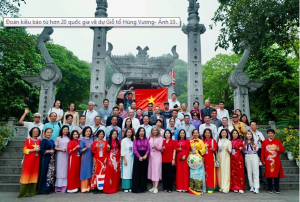
Overseas Vietnamese return home to commemorate Hung King - legendary nation founders
Latest
The delegation, led by Deputy Minister of Foreign Affairs Le Thi Thu Hang, on April 20 offered incense to ancestors - Father Lac Long Quan and Mother Au Co, and Hung Kings.
 |
| Overseas Vietnamese return home to commemorate legendary nation founders. (Source: VNA) |
The annual programme is jointly held by the SCOV, the Ministry of Foreign Affairs, and Phu Tho People’s Committee, contributing to raising overseas Vietnamese (OVs)'s pride of the nation’s heroic traditions, and strengthening the great national solidarity.
The programme shows care, affection and responsibility of the Party and the State for OVs, better meeting their cultural and spiritual needs while affirming that they are an integral part of the nation.
Every year, activities worshipping Lac Long Quan and Au Co take place ahead of the anniversary of Hung Kings on the 10th day of the third lunar month, which fell on April 18 this year.
Legend has it that Lac Long Quan (real name Sung Lam, son of Kinh Duong Vuong and Than Long Nu) married Au Co (the fairy daughter of De Lai). Au Co then went on to give birth to a pouch filled with one hundred eggs, which soon hatched into a hundred sons. However, soon thereafter, Lac Long Quan and Au Co separated. Lac Long Quan went to the coast with 50 of the children, while Au Co went to the highlands with the rest.
Their eldest son was made king, who named the country Van Lang and set up the capital in Phong Chau (modern-day Viet Tri city in Phu Tho province), beginning the 18 generations of the Hung Kings.
The kings chose Nghia Linh Mountain, the highest in the region, to perform rituals devoted to rice and sun deities to pray for healthy crops.
To honor their great contributions, a complex of temples dedicated to them was built on Nghia Linh Mountain, and the 10th day of the third lunar month serves as the national commemorative anniversary for the kings.
The worship of the Hung Kings, closely related to the ancestral worship traditions of most Vietnamese families, was recognized as part of the Intangible Cultural Heritage of Humanity by UNESCO in 2012.

















